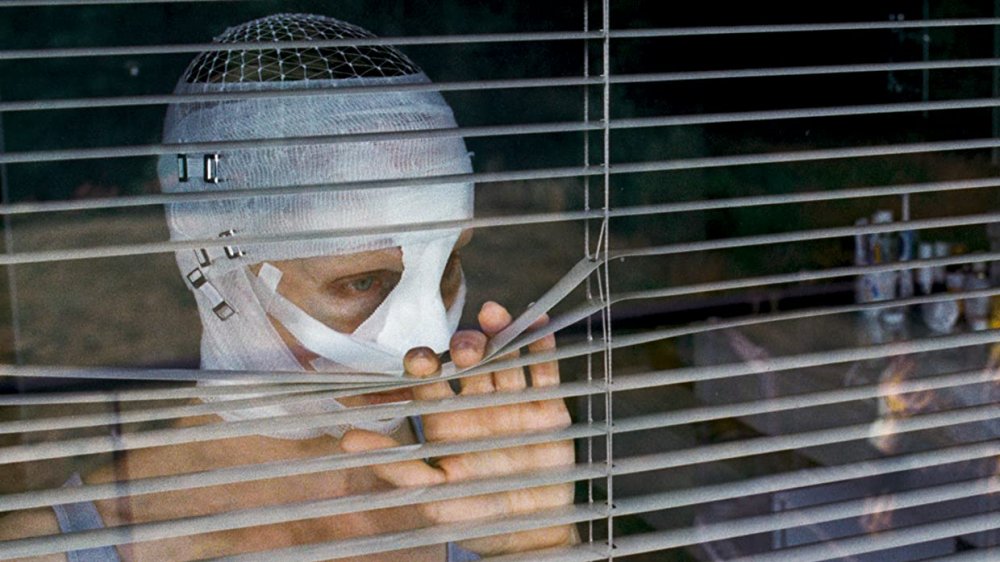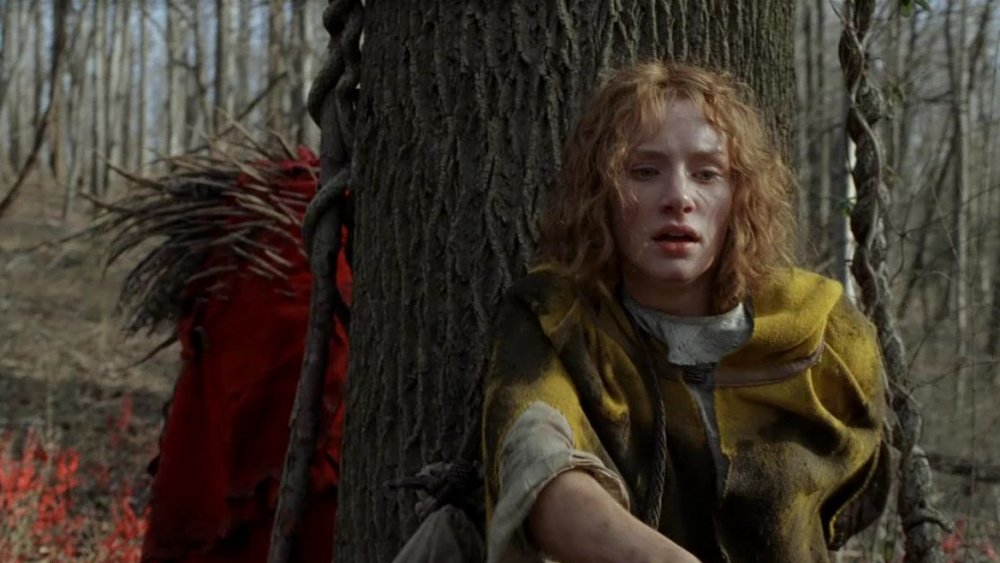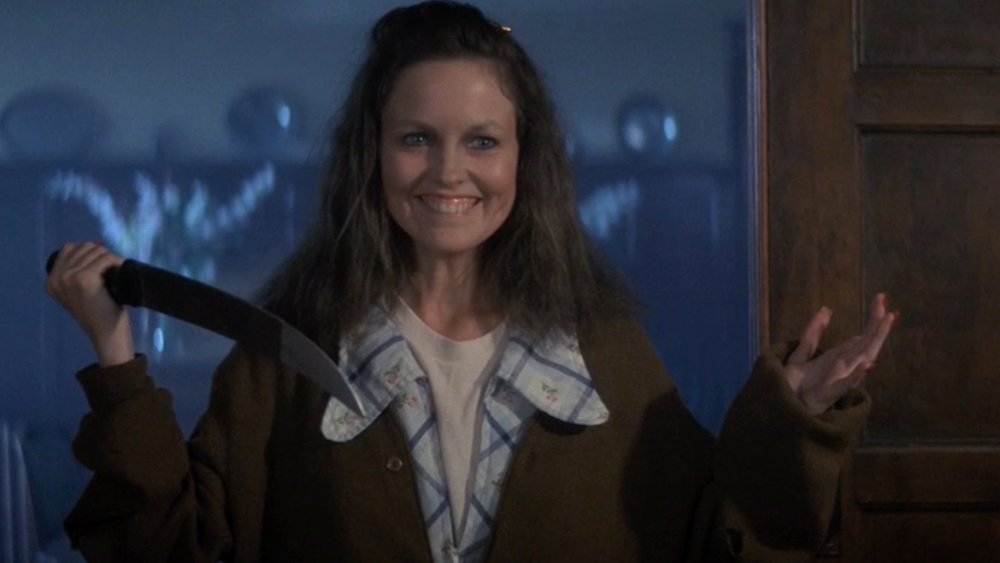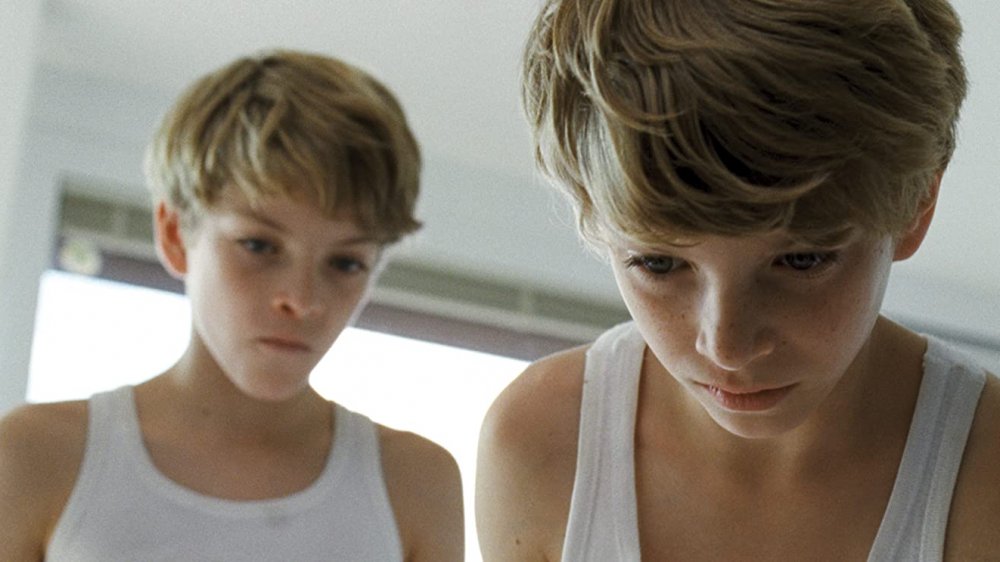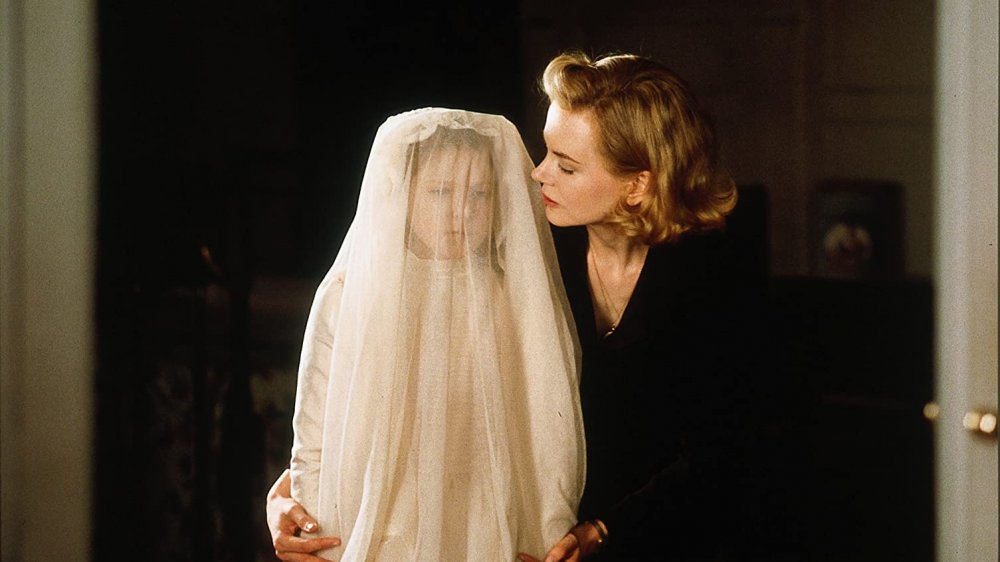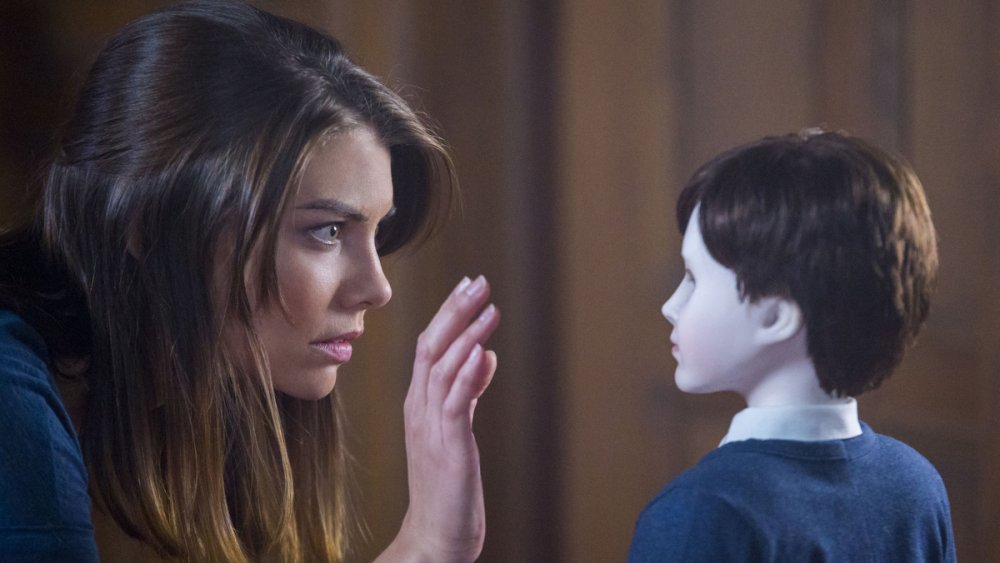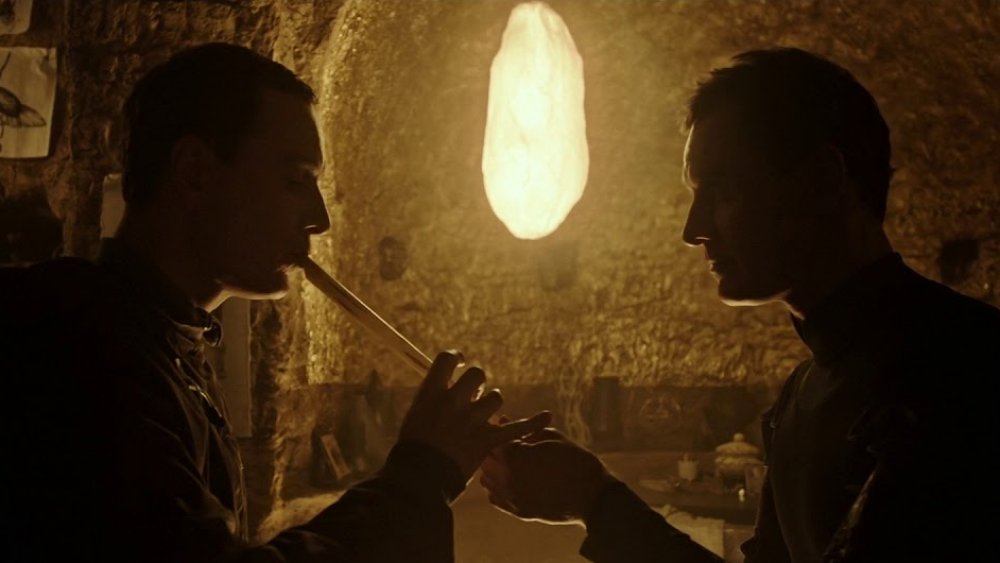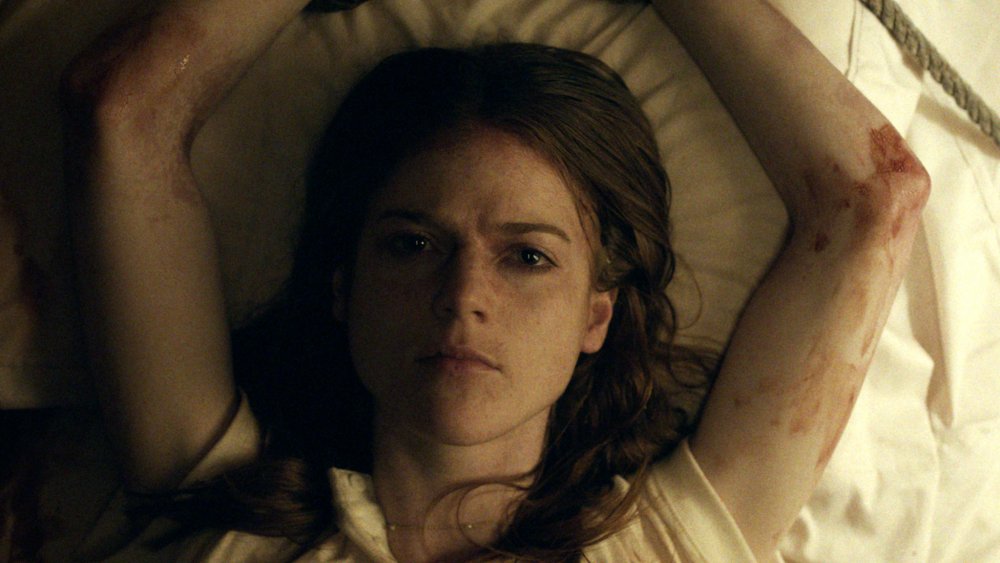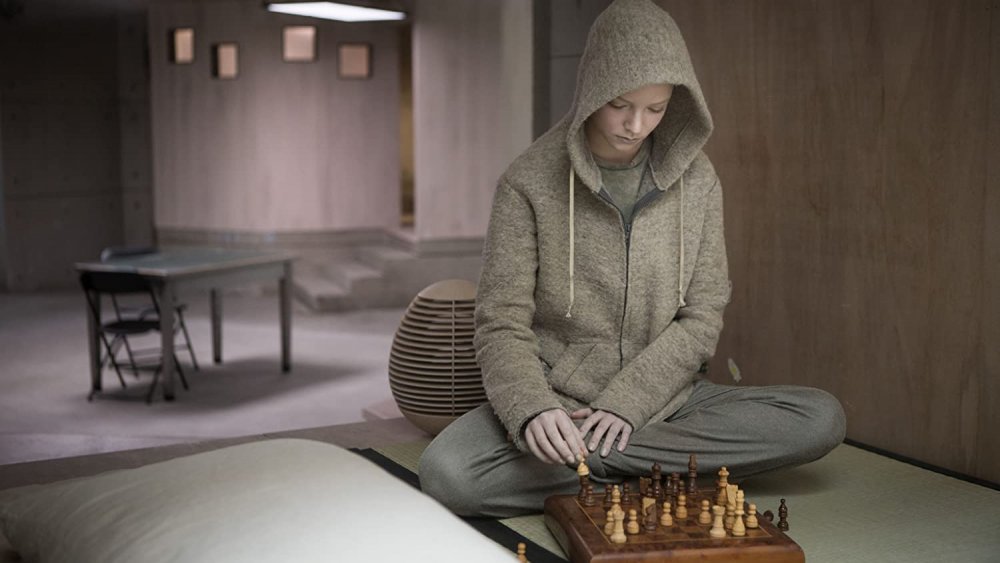The Most Obvious Twists In Horror Movies
In horror films, the element of surprise is crucial to achieving an effective scare. That's one of the reasons why jump scares are so pervasive in the genre — they're an easy way of shocking the audience and heightening the tension of any given scene. However, their usefulness is typically limited to providing a cheap thrill here and there. What separates the best horror movies from the rest of the pack isn't a jump scare, but an effective twist.
Horror films like Friday the 13th, The Sixth Sense, and Saw are remembered fondly for their shocking twist endings. But pulling off a twist isn't easy — what makes those films so memorable is how well they lay the groundwork for their big reveals. Clues left throughout the film contextualize the twist itself, uniting the surprise with the rest of the movie instead of merely tacking a shocking moment onto the end. However, not every film achieves this balance between foreshadowing and surprise. Some horror movie twists are downright expected. These are the horror films that show their hand too early, making their twist endings tragically obvious.
The Village
M. Night Shyamalan is known for his twist endings, so viewers go into his films on the lookout for clues. While The Village may have surprised some audiences with its ending, many had it all figured out long before the final scene.
Isolated from the rest of the world, a small village fears the surrounding woods, which are full of mysterious human-like monsters. Despite the apparent dangers lurking beyond, young Ivy finds herself having to leave the safety of the village to save her wounded boyfriend. The twist comes into play when Ivy discovers the modern world, revealing that the entirety of the film actually takes place in the current day.
The Village hints towards its twist early and often. For one thing, the Elders allow Ivy, a blind woman, to venture into the forbidden woods. Why not send a heavily armed man, unless there's something the Elders are trying to hide? Additionally, the dialogue seems more like what you'd hear at a Renaissance festival than what you'd find in an authentic period piece. This could be the fault of inadequate direction, but it's probably more likely to have been a conscious decision. Indeed, it does make Ivy and the world she inhabits feel "off" — to the point that the reveal fails to surprise.
Secret Window
In the adaptation of Stephen King's Secret Window, Johnny Depp plays Mort Rainey, a best-selling true-crime writer in the middle of a nasty divorce. Now living alone in an isolated cabin, Rainey is left to work on his manuscript. In typical Stephen King fashion, Rainey struggles to write a compelling end to his story. However, ending his book becomes the least of his worries when a strange man named Shooter knocks on Rainey's door and presents him with a manuscript. Shooter claims that Rainey stole his work, and upon closer inspection, Rainey realizes that Shooter's story is exactly the same as a short story he had published years prior, "Secret Window." Though Rainey knows he isn't guilty of plagiarism, Shooter refuses any explanation and terrorizes Rainey by killing his dog, and later, the people close to him.
For fans of The Shining, the parallels should be evident from the get-go: A writer struggles with his work in isolation and slowly becomes more detached from reality. Even without prior knowledge of King's work or other similar horror stories, Secret Window isn't very subtle. The film practically spells out that Rainey is losing his mind and that Shooter isn't real through blatant inner dialogue, revealing discussions, and pointed imagery. Secret Window is certainly a fun film, but it's definitely bad at keeping its own secrets.
April Fool's Day
Unsurprisingly, a movie called April Fool's Day features a whole lot of hijinks. You really don't even have to watch the film to figure out the ending to this underrated slasher parody — it's pretty easy to guess the twist from the title alone.
The story begins with the wealthy Muffy inviting her friends to her mansion for spring break. Upon arriving, a deranged killer begins picking the spring breakers off one by one. With no way off the island, the group has to figure out how to survive the weekend until they can take a ferry back to the mainland. But who exactly is the killer? Well, observant viewers will immediately peg Muffy as pretty suspicious. From the start, she takes delight in pranking her friends in over-the-top ways. Conveniently, Muffy also always seems to stray off on her own, then playing innocent after something terrible happens.
It turns out, as you might have guessed, that Muffy staged all of the murders. No one died — the whole thing was just a test run for her upcoming murder mystery resort. Yes, the April Fool's Day twist is that everything was a prank. While this might have fooled audiences at the time who were unaccustomed to genre parody, modern audiences will probably not be fooled by April Fool's Day.
Goodnight Mommy
The critically acclaimed Goodnight Mommy does an excellent job building up a tense and emotional atmosphere. Still, viewers will likely be able to put together its many obvious hints and figure out the film's twist within a few minutes.
After receiving cosmetic facial surgery that leaves her entire head wrapped in bandages, a mother returns to her house with her twin sons Lukas and Elias. However, after the woman acts strangely, the boys begin to suspect that she may not be their mother at all. What appears to be a story about an impostor invading the boys' home reveals itself to be a film about a boy's delusion. Throughout the film, people behave strangely around the twins, in that they only ever acknowledge Elias. He is the only brother who is given breakfast by their mother, and no one ever seems to hear anything that Lukas has to say, save for Elias. Surprise, surprise: Lukas has been dead the whole time. If you are even remotely familiar with the horror genre, you'll be able to see the twist coming and easily avoid the film's attempts at misdirection.
The Others
Though presumed dead, Grace dutifully awaits her husband's return from World War II, raising her two children alone in a grand Victorian mansion. She welcomes a trio of domestic workers into her house, thinking they have answered her ads for new servants after the previous ones inexplicably stopped coming to work. But after Grace welcomes the new help, she discovers that the postman never picked up the letters she sent, which advertised the available positions.
Aside from these odd happenings, Grace's daughter keeps alluding to something terrible that happened when the old servants disappeared. Moreover, the house begins showing signs of being haunted as doors are unlocked, lights are turned on, and Grace's daughter contends that she's talked with a boy named Victor who no one else can see. While this could point to a haunting, other clues make it evident that Grace and her family are actually dead. Notably, Grace's children remark that the food tastes strange, and when Grace pricks herself with a needle, there's no blood. With all of these clues in mind, most viewers guess the truth long before the reveal. At least it still features a killer Nicole Kidman performance?
The Boy
The Boy begins when Greta takes a job as a nanny for a boy named Brahms. When Greta arrives at her new client's home, she is surprised to find that Brahms is a doll, not a child. Apparently, the parents keep the doll around to help them grieve the loss of their deceased son, and Greta is expected to treat the doll as a living boy. Of course, Greta inevitably breaks the long list of rules she is expected to follow, and a series of seemingly supernatural events occur. The film wants to trick viewers into believing the doll is haunted, but in reality, an adult Brahms has been living in the walls of the house the whole time.
The twist in The Boy lacks subtlety, and the film isn't very effective in covering up its big secret. Lines like, "Whatever it might look like from the outside, our son is very much still with us," telegraph the coming reveal pretty clearly. Add in scenes of the mother instructing Greta to read stories louder "so that Brahms is sure to hear" as she stares pointedly at the wall instead of the person she's talking to, and you've got yourself an obvious twist. Other clues like the parents' concern over vermin in the walls and the mysterious footsteps heard around the house pretty much cement the surprise in viewers' minds long before it comes to light.
Alien: Covenant
Alien: Covenant begins when the crew of the Covenant is forced to land on a strange planet while they make repairs to their ship. After a bit of exploring, they find that life on the planet is hostile and oddly xenomorphic in nature. The crew then finds David, an android almost identical to their own android Walter, living on the planet and secretly breeding the hostile aliens. As more aliens are released, the crew fights to get back to their ship while Walter and David duel, the victor of their fight going unrevealed. After the last surviving crew member is locked into their cryo-sleep pod on the Covenant, they realize that David has replaced Walter, intending to use the aliens to kill even more people when the ship reaches its destination.
Considering the switcheroo twist is a trope as old as time, this reveal is practically telegraphed from the moment David and Wallace are shown onscreen together. David's explicit goal is to eliminate the human race, so it should be a no-brainer that he would take Wallace's place to get close to humans and execute his plan. Adding further obviousness to the twist is the cutaway before the end of David and Wallace's fight, very clearly indicating that something fishy is going on with the androids.
Honeymoon
Honeymoon's premise is simple: Newlywed couple Bea and Paul decide to spend their honeymoon at Bea's family's cabin in the woods. Things get off to an idyllic start but begin devolving when Bea starts behaving very strangely. All of a sudden, she starts sleepwalking, forgetting how to do basic tasks, and messing up common phrases.
While critics laud the relationship between the two leads and the micro-budget film's refreshing aversion to jump scares, Rob Hunter of Film School Rejects pointed out that the film "gives away the mystery at the seven minute mark but then still treats it like a mystery for the next hour." What makes the twist ending so evident in those first seven minutes of the film? After the perfect honeymoon vibe is established and the couple lays down to sleep, a light from outside the house shines brightly through the window and lands squarely on Bea's face right before the weirdness begins. There is little that signals alien activity in film more obviously than a beam of light coming down from the sky. While the obviousness of the twist doesn't make Honeymoon a bad film, it certainly does make the grand reveal far less exciting.
Morgan
In Luke Scott's debut film Morgan, biotech company SynSect has been attempting to fuse nanotechnology with DNA. Morgan is their big success story, as she is a nanotechnology-infused life form that has both survived its first few weeks alive and is still developing nuanced emotional responses to its surroundings. This is significant because the company's first attempt at creating this type of life form resulted in death after only two weeks. The second attempt had trouble with emotions and killed almost two dozen researchers at a different site.
This information is given to Lee Weathers, a stoic risk management specialist who has been sent to deal with the risks Morgan poses to the future of the project as her strength, emotions, and mental faculties mature and grow more potent. As Morgan becomes rebellious, Weathers decides she needs to eliminate Morgan, who fights back. Given that Weathers is up against a powerful robotic being, she should be at a stark disadvantage ... but somehow, she is on even footing with the superhuman.
All signs point to Weathers being the second attempt at creating nanotechnology-infused life. She fits every aspect of the description, from being emotionally cool to exhibiting an alarming degree of prowess in combat. As Entertainment Weekly writer Chris Nashawaty so eloquently put it, "Anyone who's semiconscious will see [the twist] coming down Broadway."
